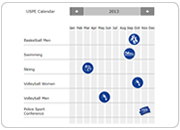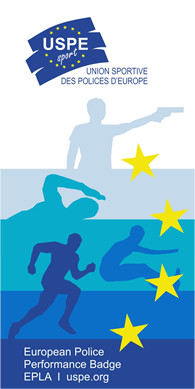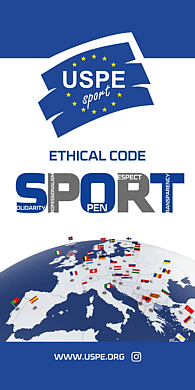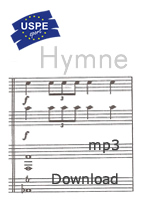| USPE |
The Union Sportive des Polices d’Europe (USPE) was founded in Paris on 30th November 1950 by ten European countries at the initiative of the French Police Sports Association. Its founding members were Belgium, Denmark, Finland, France, the United Kingdom, Luxembourg, the Netherlands, Norway, Sweden and Switzerland. While USPE had twelve members in 1976, its membership had grown to 20 by the 23rd Congress that was held in Berlin/Germany back in 1990. After the fall of the Berlin Wall and Europe's opening-up towards the East, it was also possible to admit Eastern European nations as USPE members. Today, USPE is made up of 39 European countries.
USPE's headquarters is situated in Switzerland.
Objectives
USPE's objective is to promote police sport within its member countries.
USPE organises European Police Championships (EPC) held at four-year intervals by the member countries in 16 sporting disciplines. At present, EPC take place in Athletics, Basketball, Cross Country, Football, Handball, Judo, Marathon, Cycling, Wrestling, Shooting, Swimming, Skiing, Tennis, Table Tennis, Triathlon and Volleyball.
USPE is seeking to promote and increase the proportion of women in police sport. With the exception of Wrestling, all championships are organised for men and women alike.
Every two years, USPE also hosts a European Police Sport Conference that is of considerable importance as it ensures fruitful cooperation by providing a discussion forum for the member countries. For instance, the previous Conferences formulated the "Mission, Vision and Values" of USPE, further developed the European Police Sports Badge (EPLA), while also focusing on ways and means to professionalise the organisation of EPC. Apart from that, the Conference also offers member countries a platform for showcasing the way police sport is practised in their respective countries.
Besides promoting police sport, such events are instrumental in fostering contacts between individuals, while raising an awareness and understanding of different cultures, which will eventually result in the harmonisation of intercultural cooperation in everyday policing.
USPE is recognised and supported by the International Olympic Committee (IOC).
Moreover, USPE seeks to forge ties and develop joint projects with the European and International Sports Federations for putting sport on a broad basis all over Europe.
Currently, USPE holds cooperation agreements with the Union of European Football Associations (UEFA), the European Handball Federation (EHF), the International Basketball Federation (FIBA), the European Judo Union (EJU) and the European Swimming Federation (LEN).
This cooperation permits USPE to professionally organise the championships, while allowing it to show sport in a positive light towards the ministries.
For promoting police sport in general and for maintaining the health of European police officers, USPE completely revised the EPLA in close cooperation with the Technical University of Munich and in line with sports science standards.
Congress
The supreme body of USPE is the Congress that takes place every two years. Inter alia, it determines USPE's strategic direction and decides on the admission of new countries and the amendment of the respective sets of rules. In addition, the Congress elects the members of both the Executive Committee (EC) and the Technical Commission (TC) as well as the Auditors. Irrespective of its size, each member country has two votes.
Executive Committee
Between Congresses, the EC is responsible for running USPE's affairs. It is made up of the President, two Vice-Presidents, the Secretary General, the General Treasurer as well as five Assessors. The EC is headed by the President, and the members of the EC are elected by the Congress for a four-year term by secret ballot. They can be re-elected twice.
Technical Commission
Chaired by the Secretary General, the TC is responsible for all technical aspects related to the various sporting disciplines. It comprises eight members from different member countries. Each member is responsible for two of the sporting disciplines represented within USPE. Apart from the Secretary General, the Technical Delegates are to ensure the proper organisation and conduct of EPC in line with USPE rules.
Furthermore, the work of the TC also focuses on updating the Competition Rules. If need be, the respective amendments are proposed by the EC.
The members of the TC are elected by the Congress by secret ballot for a period of four years. They may be re-elected twice.
Fight against doping
USPE has acknowledged the WADA Code and actively fights against doping.
For this purpose, USPE has an Anti-Doping Commissioner whose tasks include consulting the various USPE bodies and raising awareness of Anti-Doping issues amongst athletes. The Anti-Doping Commissioner works closely with the World Anti-Doping Agency (WADA) as well as the Medical Commission and the Disciplinary Commissions of the USPE.
The Medical Commission, which is made up of three doctors, is the competent body for granting Therapeutic Use Exemptions (TUEs) in accordance w ith the WADA rules.
The Disciplinary Commissions – a Disciplinary Tribunal of first instance and a Disciplinary Court of Appeal – have disciplinary power over the members of the USPE that have violated the Anti-Doping Regulations. Both Judicial Bodies shall be composed of a pool of arbitrators, at least five members for each Judicial Body.
Anti-doping tests are performed during each and every EPC.









